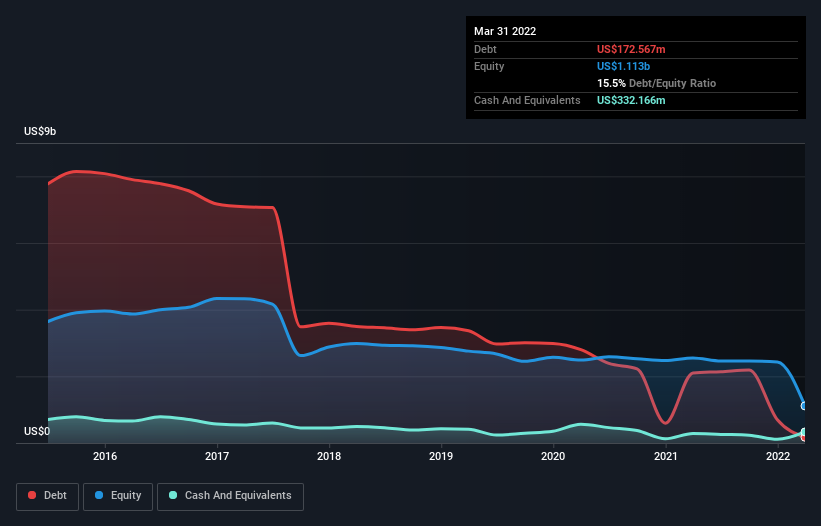Howard Marks put it nicely when he said that, rather than worrying about share price volatility, 'The possibility of permanent loss is the risk I worry about... and every practical investor I know worries about.' When we think about how risky a company is, we always like to look at its use of debt, since debt overload can lead to ruin. As with many other companies Teekay Corporation (NYSE:TK) makes use of debt. But should shareholders be worried about its use of debt?
What Risk Does Debt Bring?
Debt is a tool to help businesses grow, but if a business is incapable of paying off its lenders, then it exists at their mercy. If things get really bad, the lenders can take control of the business. While that is not too common, we often do see indebted companies permanently diluting shareholders because lenders force them to raise capital at a distressed price. Of course, plenty of companies use debt to fund growth, without any negative consequences. When we examine debt levels, we first consider both cash and debt levels, together.
View our latest analysis for Teekay
What Is Teekay's Debt?
You can click the graphic below for the historical numbers, but it shows that Teekay had US$172.6m of debt in March 2022, down from US$2.10b, one year before. However, its balance sheet shows it holds US$332.2m in cash, so it actually has US$159.6m net cash.

A Look At Teekay's Liabilities
Zooming in on the latest balance sheet data, we can see that Teekay had liabilities of US$250.9m due within 12 months and liabilities of US$595.2m due beyond that. Offsetting this, it had US$332.2m in cash and US$142.1m in receivables that were due within 12 months. So its liabilities total US$371.8m more than the combination of its cash and short-term receivables.
When you consider that this deficiency exceeds the company's US$320.3m market capitalization, you might well be inclined to review the balance sheet intently. Hypothetically, extremely heavy dilution would be required if the company were forced to pay down its liabilities by raising capital at the current share price. Given that Teekay has more cash than debt, we're pretty confident it can handle its debt, despite the fact that it has a lot of liabilities in total. There's no doubt that we learn most about debt from the balance sheet. But you can't view debt in total isolation; since Teekay will need earnings to service that debt. So when considering debt, it's definitely worth looking at the earnings trend. Click here for an interactive snapshot.
Over 12 months, Teekay made a loss at the EBIT level, and saw its revenue drop to US$711m, which is a fall of 6.1%. That's not what we would hope to see.
So How Risky Is Teekay?
While Teekay lost money on an earnings before interest and tax (EBIT) level, it actually generated positive free cash flow US$59m. So although it is loss-making, it doesn't seem to have too much near-term balance sheet risk, keeping in mind the net cash. Given the lack of transparency around future revenue (and cashflow), we're nervous about this one, until it makes its first big sales. To us, it is a high risk play. The balance sheet is clearly the area to focus on when you are analysing debt. But ultimately, every company can contain risks that exist outside of the balance sheet. To that end, you should be aware of the 1 warning sign we've spotted with Teekay .
When all is said and done, sometimes its easier to focus on companies that don't even need debt. Readers can access a list of growth stocks with zero net debt 100% free, right now.
Valuation is complex, but we're here to simplify it.
Discover if Teekay might be undervalued or overvalued with our detailed analysis, featuring fair value estimates, potential risks, dividends, insider trades, and its financial condition.
Access Free AnalysisHave feedback on this article? Concerned about the content? Get in touch with us directly. Alternatively, email editorial-team (at) simplywallst.com.
This article by Simply Wall St is general in nature. We provide commentary based on historical data and analyst forecasts only using an unbiased methodology and our articles are not intended to be financial advice. It does not constitute a recommendation to buy or sell any stock, and does not take account of your objectives, or your financial situation. We aim to bring you long-term focused analysis driven by fundamental data. Note that our analysis may not factor in the latest price-sensitive company announcements or qualitative material. Simply Wall St has no position in any stocks mentioned.
About NYSE:TK
Teekay
Provides crude oil marine transportation and other marine services worldwide.
Flawless balance sheet and good value.
Similar Companies
Market Insights
Community Narratives



